- Home
- Roger Zelazny
To Die In Italbar
To Die In Italbar Read online
To Die In Italbar
Roger Zelazny
Roger Zelazny
To Die In Italbar
To Janie and Dan Armel,
with pleasant memories
of crustacea craft,
artillery practice,
slushes, bicycles,
lots of Crocketts,
roads that went nowhere
and never on Sunday.
CHAPTER 1
On the night he had chosen months before, Malacar Miles crossed the street numbered seven, passing beneath the glowglobe he had damaged during the day.
All three of Blanchen's moons were below the horizon. The sky was slightly overcast, the few visible stars tiny and weak.
Glancing up and down the street, inhaling another puff of lung-conditioner, he moved forward. He wore a black garment with slit pockets, stat-sealed up the front. While crossing, he tested his pockets for access to the side-pacs. Having dyed his entire body black three days before, he was nearinvisible as he moved among shadows.
Atop the building across the street numbered seven, Shind sat, a two-foot ball of fur, unmoving, unblinking.
Before proceeding to Employee Entrance Four, he located three key points in the durrilide wall and deactivated their alarm devices without breaking the circuits. The door at Entrance Four took him longer; but within another fifteen minutes he stood inside the building. The darkness was complete.
Donning goggles and lighting his special torch, he moved ahead, passing through aisles containing identical pieces of machinery. In recent months, he had practiced dismantling and reassembling the proper sections of this particular piece of equipment.
_A human guard is passing in front of the building_.
_Thanks, Shind_.
After a time, _He is turning up the street you took_.
_Let me know if he does anything that seems unusual_.
_He is just walking, shining his light into shadows_.
_Tell me if he stops at any of the places I stopped before I came in_.
_He has passed the first_.
_Good_.
_He has gone by the second one_.
_Capital_.
Malacar opened the housing of one of the machines and removed a component the size of a pair of fists.
_He has stopped by the entrance. He is testing the door_.
He commenced the installation of a similar-appearing component he had carried in with him, stopping only for occasional whiffs from his aerosol.
_He is moving away now_.
_Good_.
Finishing the installation, he replaced and affixed the console cover.
_Advise me when he is out of sight_.
_I will_.
He returned to Employee Entrance Four.
_He is gone_.
Malacar Miles departed then, halting only at key points to remove all traces of his visit.
After three blocks, he paused at an intersection and looked in all directions. A sudden splash of red across the sky indicated the arrival of another transport vessel. He could go no farther.
Blanchen was no ordinary world. So long as he remained within the twelve-by-twelve complex of blocks and did not trip an alarm-device on any of its windowless buildings of durrilide, he was moderately safe from detection. There were, however, several living watchmen assigned to each complex, along with rolling patrols of robots covering a larger area. This is the reason he stood within shadow. He avoided as best he could the glow-globes on each building, the lights which guided low-flying nightcraft and served to orient watchmen.
Seeing nothing at the intersection, he reentered the complex and scouted the rendezvous point.
_To your right. One block over and two ahead. A mechanical car. It is turning a corner. Go right_.
_Thanks_.
He moved to the right, keeping track of the turns he made.
_The vehicle is well off in the distance now_.
_Good_.
He retreated from a watchman, retraced a block, turned at right angles to his course, proceeded three blocks. He froze when he heard the sound of a flying machine.
_Where is it?_
_Stay where you are. You are out of their line of sight_.
_What is it?_
_A small skimmer. It came in quickly from the north. It has slowed. Now it is hovering above the street of your recent activities_.
_Oh God!_
_It is descending_.
Malacar checked the chrono on his left wrist and suppressed a groan. He patted at the bulges of various weapons that he bore.
_It has landed_.
He waited.
After a time, _Two men have emerged from the vehicle. They appear to have been its only occupants. A watchman is coming to meet them_.
_Where did he come from? Not the building?_
_No. From the opposite street. It is as if he had been waiting for them. They are talking now. Now the watchman is shrugging his shoulders_.
Malacar felt the pounding of his heart and sought to control his breathing, so as not to hyperventilate himself in the unusual atmosphere of Blanchen. He inhaled more mist from his aerosol. He started then, as two transports cut the sky in rapid succession--one headed toward the southeast, one west.
_The two men are reentering their vehicle_.
_What of the watchman?_
_He is just standing there--watching_.
He counted twenty-three heartbeats.
_Now the vehicle is beginning to rise, very slowly. Now it is drifting toward the face of the building_.
Though the night was chill, Malacar felt perspiration across his high, dark brow. He brushed it away with the edge of his forefinger.
_They are hovering. Now there is some activity. I cannot determine what it is. it is too dark-- There! Now it is light. They have replaced the globe you damaged. Now they are rising again. The watchman is waving. They are heading back in the direction from which they came_.
Malacar's great frame shook. He laughed.
Then he began working his way, slowly, back in the direction of the rendezvous point--a point he had chosen carefully, as Blanchen was no ordinary world.
In addition to the watchmen and the alarms, there were air-surveillance networks at various altitudes. On the previous evening, his vehicle had blocked them effectively on the way down, and presumably had done the same on the way back out. He checked his chrono and whiffed more of the lungcleaning vapors. He had not taken the trouble to have himself conditioned for the airs of Blanchen, in the fashion of the watchmen, laborers and technicians who dwelled there.
Less than forty minutes ...
Blanchen had no oceans, lakes, rivers, streams. Not a trace of indigenous life remained--only an atmosphere to testify that something had once dwelled there. At one point in its more recent history, the notion had been entertained of retaining a worldscaper to beat it into livable shape. It was rejected on two grounds, however: expense, and the fact that an alternative to habitation had been proposed. A combine of manufacturers and shippers had recommended that its dry lands and preservative atmosphere would provide ideal conditions for making use of the entire planet as a warehouse. They offered the discoverers full partnership in the venture, and for their own part wanted to undertake the development and staffing of the world. These terms were acceptable, accepted and accomplished.
Now Blanchen lay like a durrilitic pineapple with millions of eyes. Thousands of interstellar freighters circled constantly, and between them and the hundreds of thousands of landing docks plied the transport vessels, bringing and taking. The three moons of Blanchen served as traffic control centers and rest havens. The ground crews, working out of area centers, moving between docks and warehouses, bringing and taking. Depending upon
the output of industry and the demands of the consumer worlds, a particular dock, area or complex might be constantly busy, occasionally busy or seldom used. Ground crews were shifted according to the flows of activity. The men's pay was good, with living conditions comparable to those of the peacetime military. Unlike a warehouse which serves the world it occupies, however, while storage space means money and prolonged storage a loss thereof, transportation across interstellar distances is extremely costly.
Accordingly, goods in small demand may remain in storage for years, centuries, even. The building which Malacar had visited had remained undisturbed for almost two Earth months. Knowing this, he had expected small difficulty; that is, unless the impending deal of which he had become aware had been concluded ahead of schedule.
Considering the overworked traffic control centers, and the monitor and avoidance system programmed into his tiny, personal vessel, _The Perseus_, he did not feel that he would be taking too great a personal risk in leaving the DYNAB and entering into the territory of the Combined Leagues, in coming to Blanchen. If they found him and killed him, he would be proven incorrect. If they found him and captured him or accepted his ready surrender, they would have no choice but to send him home. But they would probably question him first, under drugs, find out what he had done and then undo it.
But if they did not find him, inside, in time ...
He chuckled, softly.
... The bird would have struck once more, halving another small worm.
His chrono gave him fifteen to twenty minutes.
_Where are you, Shind?_
_Above you, keeping watch_.
_This one, Shind, should be a good one_.
_It seemed so, from the way you described it_.
Three transports flashed above them, heading east. Malacar followed them with his eyes until they were out of sight.
_You are tired, Commander_, said Shind, reverting to a bygone formality.
_Nervous fatigue. That is all, Lieutenant. What of yourself?_
_There is some of that. My main concern, of course, is for my brother_ ...
_He is safe_.
_I know that. But he will not recall our assurances. He will grow lonely, then afraid_.
_He will come to no harm, and we will be united soon_.
There was no reply, so Malacar sniffed his vapors and waited.
Half-dozing (for how long?), he was alerted:
_She comes! Now! She comes!_
Smiling, he stretched his muscles and looked upward, knowing that for a few moments he would be unable to see that which the eyes of Shind had already detected.
It dropped like a spider and hung like a grim festival float. For a moment it hovered above him, while Shind boarded it. Another moment, and it had lowered itself farther and extended the drop-bar. Seizing it, he put his weight upon it and was taken up into the belly of _The Perseus_, passing by that mask of Medusa with the smile of the Mona Lisa which he had painted there himself. He longed for a serpent, but would settle for worms.
He spat out of the hatch just before it closed, striking the side of the building below him.
* * *
Heidel von Hymack, on the way to Italbar, watched his companions die. There had been nine of them--volunteers all--who had set out to accompany him through the rain forest of Cleech to the mountain town Italbar where he was needed; Italbar, a thousand miles distant from the space port. He had taken an air car to reach it. Forced down, he had told his story to the villagers by the River Bart, who had come upon him walking westward. Now five remained of the nine who had accompanied him against his protestations. Now one of the five was sweating, and another coughed periodically.
Heidel ran his hand through his sandy beard and continued to kick his black boots through the growth that covered what was supposed to be a trail. He perspired and his shirt stuck to him. He had warned them that it was dangerous to accompany him, he reflected. It was not as if he had not warned them.
They had heard of him, heard that he was a holy man, heard that he was on an errand of mercy.
"The last part is correct," he had told them, "but you will not score any heavenly merit points because of me."
They had laughed. No, he would need someone to protect him from the animals and show him the trail.
"Ridiculous! Point me in the right direction and I will get there," he had said. "You will be in more danger in my company than you would be out there alone."
But they had laughed again and refused to show him the way unless he permitted an escort to accompany him.
"But it can be death to be with me for too long a period of time!" he had protested.
They were adamant.
He had sighed.
"Very well, then. Give me a place where I may be completely alone and undisturbed for a day or so. It will be an expenditure of valuable time, time that should not really be lost at this point. But I must try to protect you if there is no other way that you will assist me."
They did this, and then they danced about one another and laughed at their part in a great adventure. Heidel von Hymack, the green-eyed saint from the stars, was obviously going to pray, to arrange things for their safety and the success of the trip.
Two or three days, walking, they had told him. So he had tried forcing the catharsis in order to get under way. A child lay dying in Italbar, and he had come to measure the minutes in terms of her breathing.
The Blue Lady had told him to wait, but he thought of that breathing and of the contractions of a large heart that had once been tiny. He had started out after fifteen hours and it had been a mistake.
The fevers of two of his companions had gone undetected, because of fatigue and the excessive heat of the forest. They had expired on the afternoon of the second day. He was unable to identify which of the many possible diseases it was. This was because he did not try very hard. Once a man is dead, he considered the means an academic point. In addition, his desire for urgency was such that he begrudged the others even the brief funeral ceremony and burial in which they indulged. He felt this doubly on the following morning, when two of the remaining seven did not awaken and he was compelled to witness the same rite repeated. He cursed in other languages as he helped prepare the graves.
The faceless, laughing ones--for so he had come to consider them--now possessed expressions and lacked laughter. Their ruby eyes were wide and darted at every sound. The six digits of their hands shook, writhed, snapped. Now they were beginning to understand. Now it was too late.
But two or three days ... This was the third day, and the mountains were nowhere in sight.
"Clay, where are the mountains?" he asked the coughing one. "Where is Italbar?"
Glay shrugged and pointed ahead.
The sun, a giant yellow ball, was all but invisible from their trail. Its light leaked through the starfish leaves, but in every place that it missed there was moisture or fungus. Small animals or large insects--he did not know which--darted from their path, scurried behind them, rattled the bushes and moved along the branches. The larger creatures of which he had been warned never appeared, though he heard their hisses, their whistles, their barks often in the distance; and occasionally there was the sound of something huge crashing through the forest near at hand.
He was taken by the irony of it. He had come to save a life and the effort had already cost four. "Lady, you were right," he muttered, thinking of his dream.
It was perhaps an hour later that Clay collapsed, racked with coughing, his normally olive complexion the color of the leaves about them. Heidel moved to his side, recognizing the condition. Given several days' preparation, he might have been able to save the man. He had failed when he had tried with the others because his own catharsis had not been complete. The necessary balance had been lacking. At that moment--as he had looked upon the first of the fallen--he had known that all nine of them were going to die before very long. He helped to make Clay comfortable, back against a tree trunk, his pack for a pillo
w, gulping water. He glanced at his chrono. Anywhere from ten minutes to an hour and a half, he guessed.
He sighed and lit a cigar. It tasted foul. The moisture had long before gotten to it, and it was obvious that the fungi of Cleech had nothing against nicotine. The little green mound of it that flared momentarily smelled something like sulfur.
Clay looked up at him. A glare of accusation seemed to be in order.
Instead, "Thank you, Heidel," he said, "that we may share with you in this thing," and then he smiled.
Heidel wiped the man's brow. It took him another half hour to die.
This time he did not mumble to himself during the burial, but studied the faces of the remaining four. The same expression was present. They had started out with him as though on a lark. Then the situation had changed and they had accepted it. It did not seem a matter of resignation either. There were expressions of happiness on their dark faces. Yet they all knew it, he could tell. They all knew they were going to die before Italbar.
He appreciated stories of noble sacrifices as well as any man. But futile deaths--! To do it for no reason... He knew--and they knew, he was certain--that he could have made it to Italbar alone. All along, they had done nothing but walk with him. There had been no menacing beasts to fend off; the trail had been clear enough once he had set foot upon it. It would be pleasant simply to be a geologist, as he had been on that day ...
Two died after a lunch during which they ate little. Mercifully, it was mawl fever, previously unknown on Cleech, which makes for a sudden cardiac arrest and twists the victim's face into a smile.
Both men's eyes remained open after death. Heidel closed them himself.
They set about the business again, and Heidel did not interrupt when he saw that they were digging four graves. He assisted, and afterward he waited with them. Nor did he have long to wait.
Finishing, he shouldered his pack once more and continued on his way. He did not look back, but in his mind's eye he could see the mounds he had left behind. The obvious, grisly analogy could not be suppressed. His life was the trail. The graves were symbolic of the hundreds--no, probably thousands--of dead that he had left behind. At his touch men died. His breath withered cities. Where his shadow touched sometimes nothing remained.

 Seven Tales in Amber
Seven Tales in Amber Frost and Fire
Frost and Fire Doorways in the Sand
Doorways in the Sand Unicorn Variation
Unicorn Variation A Night in the Lonesome October
A Night in the Lonesome October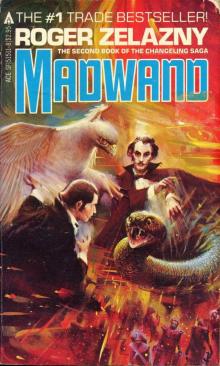 Madwand
Madwand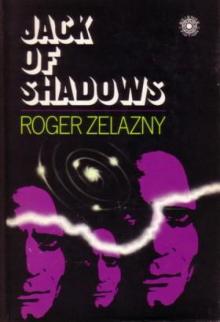 Jack Of Shadows
Jack Of Shadows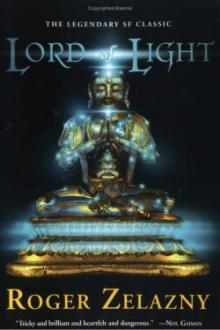 Lord of Light
Lord of Light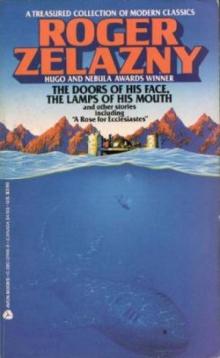 The Doors of His Face, The Lamps of His Mouth and Other Stories
The Doors of His Face, The Lamps of His Mouth and Other Stories Guns Of Avalon tcoa-2
Guns Of Avalon tcoa-2 Coils
Coils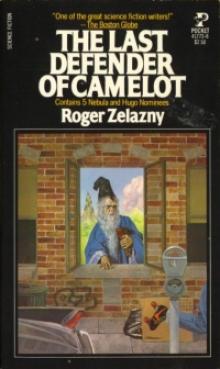 The Last Defender Of Camelot
The Last Defender Of Camelot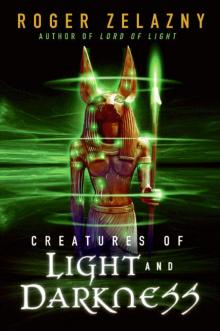 Creatures of Light and Darkness
Creatures of Light and Darkness This Immortal
This Immortal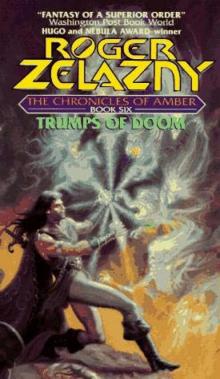 Trumps of doom tcoa-6
Trumps of doom tcoa-6 The Dream Master
The Dream Master The Complete Dilvish, The Damned
The Complete Dilvish, The Damned Nine Princes in Amber
Nine Princes in Amber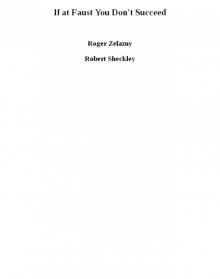 If at Faust You Don't Succeed
If at Faust You Don't Succeed Here there be dragons
Here there be dragons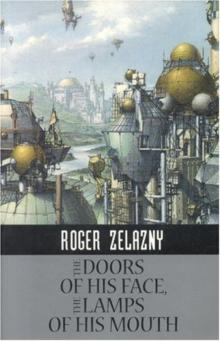 The Doors Of His Face, The Lamps Of His Mouth
The Doors Of His Face, The Lamps Of His Mouth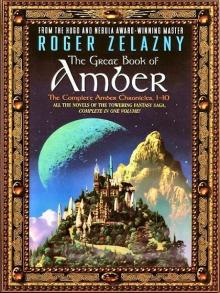 The Great Book of Amber - Chronicles 1-10
The Great Book of Amber - Chronicles 1-10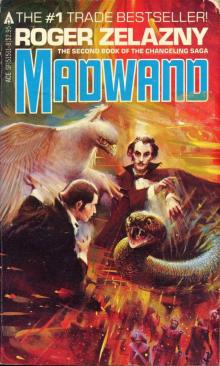 Madwand (Illustrated)
Madwand (Illustrated)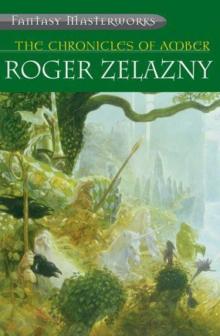 The Chronicles of Amber
The Chronicles of Amber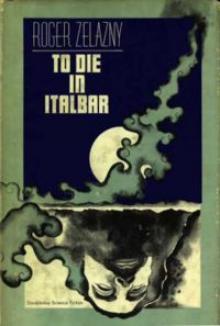 To Die In Italbar
To Die In Italbar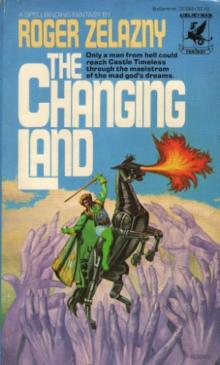 The Changing Land
The Changing Land The Furies
The Furies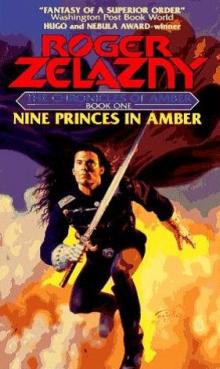 Nine Princes In Amber tcoa-1
Nine Princes In Amber tcoa-1 Last Of The Wild Ones
Last Of The Wild Ones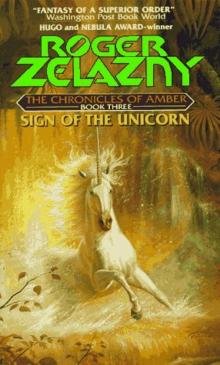 Sign of the Unicorn tcoa-3
Sign of the Unicorn tcoa-3 My Name is Legion
My Name is Legion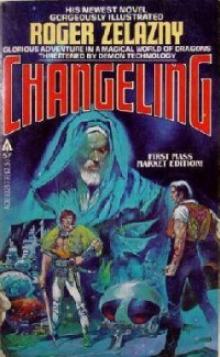 Wizard World 1: Changeling
Wizard World 1: Changeling Changeling
Changeling The Shroudling and the Guisel (amber stories)
The Shroudling and the Guisel (amber stories)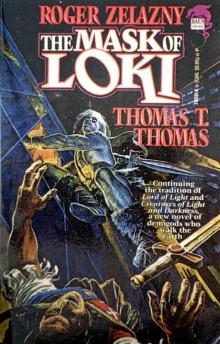 The Mask of Loki
The Mask of Loki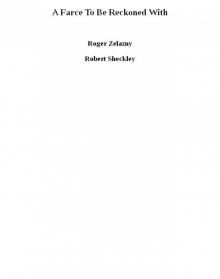 A Farce To Be Reckoned With
A Farce To Be Reckoned With Roadmarks
Roadmarks When Pussywillows Last in the Catyard Bloomed (rtf)
When Pussywillows Last in the Catyard Bloomed (rtf) Hall of Mirrors (amber stories)
Hall of Mirrors (amber stories) Permafrost
Permafrost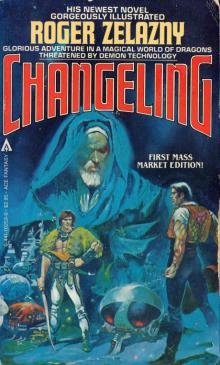 Changeling (Illustrated)
Changeling (Illustrated)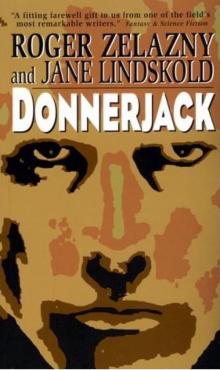 Donnerjack
Donnerjack Shadows & Reflections: A Roger Zelazny Tribute Anthology
Shadows & Reflections: A Roger Zelazny Tribute Anthology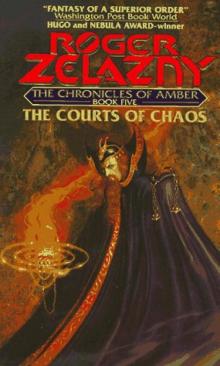 The Courts Of Chaos tcoa-5
The Courts Of Chaos tcoa-5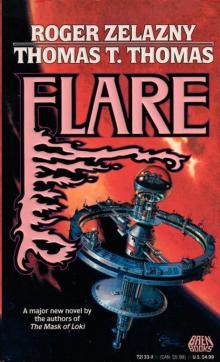 Flare
Flare Doorsways in the Sand
Doorsways in the Sand The Great Book of Amber
The Great Book of Amber Home Is the Hangman
Home Is the Hangman For a Breath I Tarry
For a Breath I Tarry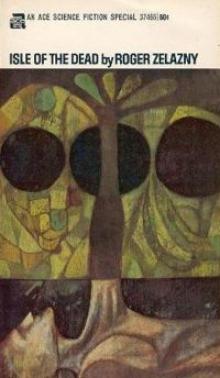 Isle Of The Dead
Isle Of The Dead Salesman Tale (amber stories)
Salesman Tale (amber stories) Dismal Light
Dismal Light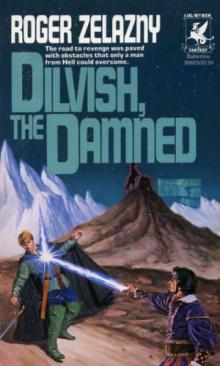 Dilvish, The Damned
Dilvish, The Damned The Black Throne
The Black Throne Wizard World 2: Madwand
Wizard World 2: Madwand The Salesman's Tale
The Salesman's Tale